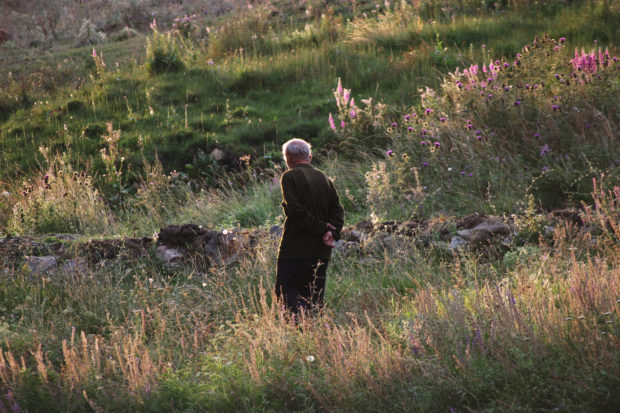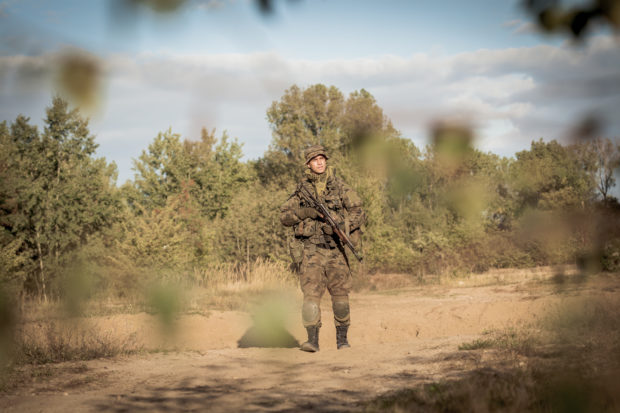Remote

INQUIRER.net stock photo
I think my sisters will agree with me on this, the one overwhelming memory we have of you: limping to your sacred spot while carrying the TV remote, a thin twig broom on your other hand to shoo the flies away, and a brown rosary around your neck.
Maisog ka man gud, ‘Lo. (You were always grouchy, ‘Lo.) Perhaps all your World War II experiences, all your bravery was still very much alive in all that crankiness, and perhaps it was a little bit because you couldn’t move as freely as you wanted to when your mind was clearly as lucid as ever. You were already 69 years old when I was born. My maternal grandfather didn’t even live to be that age. And yet when I started in high school and you were beginning your eighties, you would sit in front of the TV flicking over BBC, ANC, Al Jazeerah and other foreign news channels, already a bit hard of hearing, but still taking all the news in. Later of course, when I already had a job, it would more often be DZMM’s Teleradyo, and you would be on the side, not having any direct view of the TV, but I’m pretty sure you were still taking the news in.
I’d always brag that perhaps one of the secrets to your longevity was that your mind was still so much at work. When I was in elementary and we’d visit you, I was always awed that you could digest the newscast of all those foreign anchors and their foreign accents like it was a regular Tuesday. We only had the ABS-CBN channel at home on free TV and some regional coverage depending on the signal, so I was more used to Filipino accents. When we’d visit you, the news, the movies, even the entertainment shows (“Who Wants to be A Millionaire?”) were all in English. Being in your house was always something of a challenge.
And maybe that’s why we weren’t very close. Because the one overwhelming memory I have is of you hogging the remote to yourself, effectively isolating you from the rest of us when you started your vigil by the TV. And at times when you’d go on your long restroom breaks and I’d flick the remote to other channels, you would always be angry when you came back. When I lived with you in high school for a year, there were mornings when I’d wake up as early as 3 a.m. to take the remote and watch TV on my own, that is, if you happened to leave the remote outside your room, which wasn’t often really.
And maybe that’s why, looking back, I don’t really see myself as a TV person. I had learned to find other ways to entertain myself. Of course, I’m much older now, though not much bigger than that little girl who used to cower at your fiery, almost Spanish, temper when it would start. And I have taken to wearing socks, bonnets, sarongs, anything really, to wrap myself in when I’d feel cold, even the occasional (although getting rather frequent) Vicks to aid my breathing, in much the same way you slept with your unguents, your bonnet, socks, and with an extra blanket on top of the mosquito net to dim the light because it had to be left on for midnight restroom trips. When I was younger, I always loved sleeping on that soft bed you shared with Lola, which I’d jump on during the day and enjoy so much because it would make me bounce, unlike the banig we slept on at home.
After an hour, when Auntie Nene told me about your passing, I watched snippets of the movie Pearl Harbor again, especially the Doolittle raid, trying to recover some of your spirit. When I watched it the first time, I remember Tatay telling me that those were “tankers” they launched the B-25 Mitchells from. I was so cocky when I watched a military movie alongside you and pointed out, “Kadagko han mga tanker hano, ‘Lo?” (Those tankers are big, aren’t they, ‘Lo?), my R’s crisply rolling in my tongue. And I think you just said, “Ano? Tanker?” I thought at first that you didn’t hear me. But you may have laughed, that slightly wheezing laugh you had when something amused you to no end, and I felt crushed. There went my chance to talk with you in a language you knew so much about, and I overestimated myself terribly. Yes, those were carriers, not tankers, I learned.
But you knew how to reward us when we did do good. Tatay would always motivate (or trick?) us to do good in school and get perfect scores because he would collect our papers, and on his then-monthly conferences and visits to you, exchange those scores of 100s for P100, for each paper. We made a lot of money that you eventually had to do it per school year instead. But perhaps best of all was your letter. Because c’mon, how many 88-year-old Lolos would write their first grandchild a congratulatory letter on her college graduation? I still have it in its pristine white envelope. Nanay told me to keep it but she needn’t have. I also know a precious letter when I see one.
And perhaps this is a letter I’m writing to you, a letter you cannot anymore read. I still went to school the day after you’ve gone, because I wanted to take things off my mind with travel, in any limited way I could, in these increasingly isolating times. I couldn’t go home to see you. I can’t believe it’s been four years since what I didn’t know was the last time.
I have often wondered about what would have happened had I been born, say ten years earlier. Perhaps I would have heard more of your stories personally, not just your recollections of them on a page. And perhaps this is the real ache: for memories that are so remote because they are unborn, much like I was in probably the best years of your life. You were the only Lolo I had in my waking years and I was never even ready to be an apo. I was, and still am, so far away. I could have moved nearer, and I’m truly sorry that I didn’t. I’m not even sure anymore on which foot you limped.
I was born on a Tuesday. It was Tuesday when you were rushed to the hospital, the first time that Nanay could remember you being taken there. There are some things we don’t escape from. On Wednesday, you left.
They did fire a gun salute for you, being one of the last war heroes we have. There are many who are not aware of the last 30 or so years of our republic, much less the war you and your comrades fought. But I still have that recollection you wrote on the loose leaves of a notepad, of the liberation of Mawo, the one where I first encountered the word “bivouac” in your shaky handwriting and thought at first that it wasn’t a word. But Tatay (or was it Nanay?) told me it was, and I thought you have always been so awesome, knowing so many more words, so many more worlds than I would ever be able to share with you.
I would like to think that finally, you are mobile. That somewhere in heaven, you are marching to military drums to your heart’s content like the good soldier you are, finally without a limp, finally keen of hearing again, for eternity. Maybe still cranky. These are all maybes, really. I wouldn’t know for sure. I couldn’t.
Ninety six, huh? I’m sure your life was full. I hope we made you happy even when we had so little time. I’m barely over a quarter of the life you lived and already feeling so brittle. Even if I don’t get to live as old as you, my old bones will remember you in every cold wind hovering near my feet, or a sharp breeze over my head. I will be sure to pull on socks, maybe my old loose ones, the way you always do, with still the same warmth.
May you ever rest in God’s peace. I love you, ‘Lo.
***
(Editor’s note: The following was transcribed by the writer from a loose-leaf note of her grandfather.)

INQUIRER.net stock photo
The Liberation of Mawo
by Private First Class Medardo E. Ortego, Sr. (1924-2020)
Ten kilometers south of the town of Allen, Samar (now Northern Samar) lay the Barrio of Mawo along the north bank of Mawo River. Barrio Mawo (now Municipality of Victoria) was garrisoned by the Imperial Japanese troops. The residents of Mawo had fled to their farms.
By January 1945, the United States 6th Army had already terminated its military campaign for the liberation of Leyte.
Sometime in February 1945, Lt. Pio Magdara-og sent me on a secret mission to contact Lt. Fred Castillo in Sitio Erenas about 5 kilometers south of Mawo. One morning while I was in Erenas, I heard the drone of plane engines. As I looked up, I saw two dark blue Hellcat fighters with a white star on their bodies and wings flying high towards the direction of Mawo. When the two planes were over Mawo, they dove one after the other in a circular formation, firing their machine guns. They strafed Mawo relentlessly. It was a majestic sight to behold. This air strike forced the Japs to abandon Mawo and they fled to Calawihawan Hill and Bendetahan Hill. Both hills are about a kilometer more or less east of Mawo.
In February 1945, the Northern Samar Guerrilla group under Capt. Pedro V. Merritt (a Black man) bivouacked in San Roman approximately 5 kilometers from the west coast of Samar. Capt. Merritt had focused his curious eyes on Bendetahan Hill 3 kilometers west of our bivouac area which was garrisoned by the Japs. North of Bendetahan Hill is the Mawo River about 100 meters wide. On the north bank of the river rose the Calawihawan Hill but slightly lower than Bendetahan Hill also garrisoned by the Japs.
Capt. Merritt planned that after he gathered sufficient forces, he will seize Bendetahan Hill first, and after Bendetahan Hill, Calawihawan Hill will follow. But Capt. Merritt was still ignorant about the terrain of Bendetahan Hill. He asked Lt. Jose C. Lucero if he can find someone who can make even a rough sketch of the contours of Bendetahan Hill.
One day shortly after noon chow (slang for meal), Lt. Lucero, mindful that I was a resident of Mawo, asked me if I can work on it. I said, I’ll try. When finished, Lt. Lucero handed the sketch to Capt. Merritt. About a week later, the whole bunch of guerrilla under Capt. Merritt moved to Bo. Calagundi-an (now Municipality of San Isidro) on the west coast of Samar about 9 kilometers south of Mawo. The guerrilla had it that we are going to meet an anonymous U.S. Army Officer who will take a rubber boat from a landing craft and paddle ashore. In the morning, the anonymous officer turned out to be U.S. Army Capt. Chavez accompanied by a man-com. These two soldiers are Pinoys (Filipino-American). Capt. Merritt and his staff conferred with Capt. Chavez. Three days later, a landing craft (barge) landed in Calagundi-an, carrying a company of Pinoy soldiers. The Pinoys brought with them Garand and carbine rifles with ammunition intended for the guerrilla. The Pinoys lost no time teaching the guerrillas how to operate their weapons. The guerrillas were in high spirits, having taken hold of modern semi-automatic rifles. A carbine rifle was issued to me. And I cherished my weapon.
Days later, the Pinoys and the guerrillas moved closer to Bendetahan Hill. Sgt. Manicani was ordered to reconnoitre the Hill. But he did not return, an indication that the Japs are still there. The next day, we assaulted. The Pinoys were on our left flank. When we reached the top, the Japs were no longer there. They have fled the area. Before nightfall, we organized our perimeter and dug our foxhole, anticipating a night Jap attack. I was alone in my foxhole. I was alert, tensed, and nervous [that] the [Japs] might return in a moment. But it did not happen. At about 3 in the morning came the order to form our firing line facing the Jap garrison on Calawihawan Hill. The Pinoys positioned on our left flank.
Suddenly, all broke hell. The mortars kept falling on Calawihawan Hill and machine guns and rifles kept a sustained firing. The muzzle of my carbine was also flaming. While I was firing my weapon I felt my fear had vanished. I also hoped that my bullets will find its target on the Jap garrison. The Japs also responded. They returned fire towards us but not for long. Probably they are already low on ammunition. After about 20 minutes of sustained firing, the order came to cease firing. During this lull, we found out that Lt. Ramas, guerrilla, was killed. At first light of dawn we began descending Bendetahan Hill and waded across Mawo River in the shallow portion. When we reached the North bank, we climbed Calawihawan Hill until we reached the top.
At sunrise, we saw blood stains on the ground, in coconut trunks and tree branches, but saw no Japs. They have fled eastward into the jungle, probably carrying the dead and the wounded. Then we began descending Calawihawan Hill and occupy the barrio of Mawo. The residents returned to their homes this time, free from the ruthless Japs. Thus, Mawo was liberated.
This military campaign retained in my mind an unforgettable, terrible experience in combat.
_
Ma. Carmie Flor I. Ortego is a teacher for senior high school at the National University and a graduate student of De La Salle University under its Master of Fine Arts in Creative Writing program. She has earned fellowships from the 13th Iyas and 20th Iligan national writing workshops for her poetry in Cebuano and Waray. Her essays have also appeared in various national and literary publications, and have been featured in Anvil’s “Creative Nonfiction: Crafting a Knowledge of Self, Others, and the World”.
https://www.facebook.com/inquirerdotnet/videos/2263942083864572/
RELATED STORIES:
Images from a non-relationship

Image: INQUIRER.net/Marie Faro




















